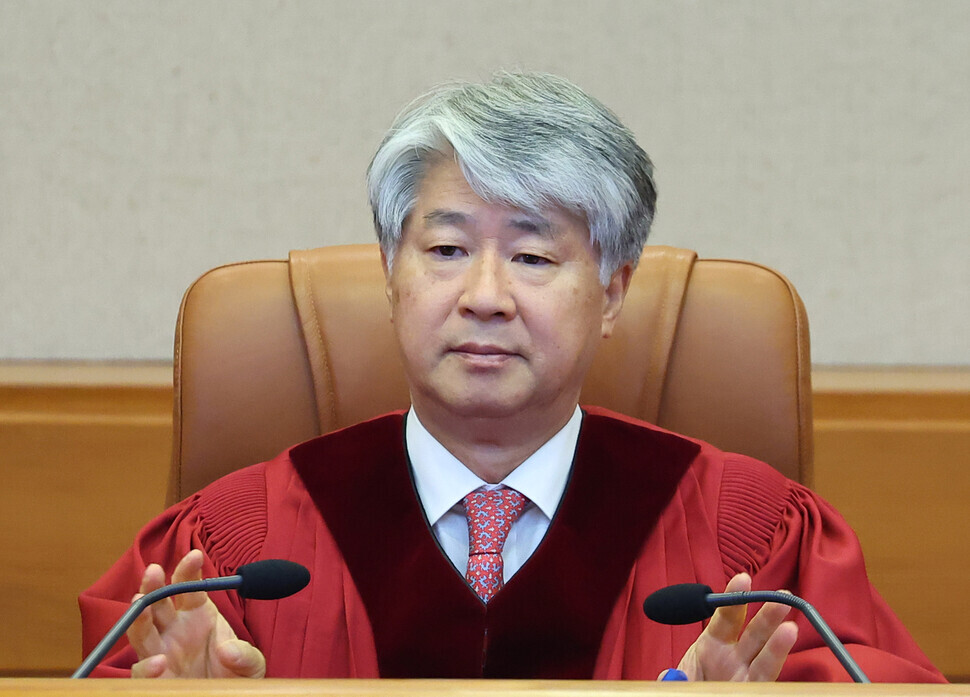hankyoreh
Links to other country sites 다른 나라 사이트 링크
[Editorial] Court’s reversal of prosecutor’s impeachment will only embolden his peers

On Thursday, Korea’s Constitutional Court overturned the impeachment of a sitting prosecutor who had indicted Yu Woo-sung as revenge for his acquittal on charges of spying while working as a civil servant for the city of Seoul.
The National Assembly had passed a bill of impeachment against a prosecutor named Ahn Dong-hwan after the Supreme Court ruled that Ahn had abused his authority to indict, but five conservative-leaning justices on the nine-person Constitutional Court opposed the bill.
Those five justices said that Ahn’s behavior was not grounds for being dismissed from his post. But what would be grounds for dismissal if not tormenting a citizen with an indictment that was unlawful and vindictive, as the Supreme Court itself effectively acknowledged?
In 2014, Yu was acquitted of espionage charges after a Chinese government document submitted to a court as supporting evidence turned out to have been forged. After some of Ahn’s fellow prosecutors were disciplined in connection with the incident, Ahn charged Yu with violating the Foreign Exchange Transactions Act by remitting money to North Korea, a charge that prosecutors had decided not to file against Yu four years earlier.
In 2021, the Supreme Court upheld a high court’s dismissal of the charges against Yu. The high court had ruled that the indictment of Yu “did not appear to be a normal or appropriate exercise of prosecutorial discretion” and that “given the apparent existence of ulterior motivations, the arbitrary exercise of the authority to indict is unlawful.” In short, the court found that Ahn had abused his authority to indict because of his desire to retaliate against Yu for being acquitted of the espionage charges.
Yu had undergone immense mental and physical suffering during the long trial after he was indicted based on evidence that had been forged by the National Intelligence Service. To then indict Yu on a separate case, subjecting him to even more suffering, goes against public servants’ constitutional duty to serve the public interest.
That duty is particularly heavy for a prosecutor like Ahn who wields immense power to apply the state’s criminal code. And yet, the five judges on the Constitutional Court who overturned Ahn’s impeachment asserted that his behavior did not amount to grounds for dismissal. We wonder whether the court would have reached such a decision if Ahn had been not a prosecutor, but an ordinary civil servant.
Given prosecutors’ de facto monopoly on both investigations and indictments in Korea, they’re rarely even investigated for most kinds of criminal behavior. Ahn did not face an internal probe or disciplinary measures and cannot face criminal charges because the statute of limitations has expired. Prosecutors are a privileged bunch who face no consequences for misconduct unless they’re impeached.
That’s why we should pay even more attention to the minority opinion of justices Kim Ki-young, Moon Hyung-bae, Lee Mi-son and Jung Jung-mi: “Considering that prosecutors have been bestowed with various kinds of authority as representatives of the public interest and institutional advocates of human rights, violations of their duty to serve the public interest should face heavy constitutional penalties to ensure that prosecutorial infractions of the constitution are not repeated.”
Regrettably, this decision by the Constitutional Court is likely to only reinforce prosecutors’ sense of privilege.
Please direct questions or comments to [english@hani.co.kr]

Editorial・opinion
![[Editorial] It’s time for us all to rethink our approach to North Korea [Editorial] It’s time for us all to rethink our approach to North Korea](https://flexible.img.hani.co.kr/flexible/normal/500/300/imgdb/original/2024/0621/7517189559819182.jpg) [Editorial] It’s time for us all to rethink our approach to North Korea
[Editorial] It’s time for us all to rethink our approach to North Korea![[Column] Why empty gestures matter more than ever [Column] Why empty gestures matter more than ever](https://flexible.img.hani.co.kr/flexible/normal/500/300/imgdb/original/2024/0619/7217187833478369.jpg) [Column] Why empty gestures matter more than ever
[Column] Why empty gestures matter more than ever- [Editorial] Seoul’s part in N. Korea, Russia upgrading ties to a ‘strategic partnership’
- [Column] The tragedy of Korea’s perpetually self-sabotaging diplomacy with Japan
- [Column] Moon Jae-in’s defense doublethink
- [Column] S. Korea-China cooperation still has a long way to go
- [Editorial] Seoul must use tact and diplomacy to check deepening Russia-NK ties
- [Editorial] Thorough audit, evaluation of oil test drilling are needed
- [Editorial] Yoon prioritizes his administration over South Korea’s safety once again
- [Column] The monumental shift in N. Korea’s nuclear program that never happened
Most viewed articles
- 1[Editorial] It’s time for us all to rethink our approach to North Korea
- 2North Korea’s real motive for publishing the full text of new treaty with Russia
- 3[News analysis] N. Korea’s new pact with Russia is ‘mirror image’ of Yoon’s alliance with US
- 4Seoul hints at lethal weapons aid to Ukraine to put pressure on Russia
- 5Seoul decries N. Korea-Russia mutual defense pact as ‘absurd’
- 6Hot weather hat trick to send the mercury soaring in Korea
- 7[Editorial] Seoul’s part in N. Korea, Russia upgrading ties to a ‘strategic partnership’
- 8[Editorial] Fortified N. Korea-Russia ties should be a wakeup call for Seoul
- 9Putin, Kim pledge ‘mutual assistance’ in event of outside aggression
- 10[Photo] K-pop: For everyone, everywhere